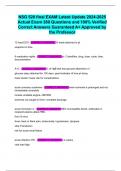NSG 520 final EXAM Latest Update 2024-2025
Actual Exam 380 Questions and 100% Verified
Correct Answers Guaranteed A+ Approved by
the Professor
12 lead ECG - CORRECT ANSWER: 10 leads attached to pt
snapshot in time
6 medication rights - CORRECT ANSWER: pt- 2 identifies, drug, dose, route, time,
documentation
A1C - CORRECT ANSWER: % of HgB that has glucose attached to it
glucose stays attached for 120 days- good indicator of how pt doing
lower levels= lower risk for complications
acute coronary syndrome - CORRECT ANSWER: when ischemia is prolonged and not
immediately reversible
include unstable angina- NSTEMI
ischemia not caught in time= complete blockage
acute hemolytic rx - CORRECT ANSWER: ABO incompatible blood- antibodies in
recipient plasma attack RBC
first 15 mins
fever, back or flank pain, tachycardia, hypotension, dyspnea
stop Transfusion
risk for acute renal fialure
acute infection HIV - CORRECT ANSWER: 2-4 weeks
viral load high
,mono like s/s
acute myelogenous leukemia - CORRECT ANSWER: common in kids
s/s- fever, bleeding, progressive weakness, bone or joint pain, bleeding tendencies
acute phase burn care - CORRECT ANSWER: 36-48 hours after injure when fluid shift
resolves
airway, fluids, pain and anxiety, wound management- monitor for infection, nutrition,
hypothermia bc person does not have subQ tissue
afrezza - CORRECT ANSWER: inhaled insulin
onset 12-15 min
peak 60 min
duration 2.5-3 hr
age changes neuro - CORRECT ANSWER: more likely to have hypo
decrease in memory, vision, senses
less body temp regulation
decreased dietary intake
increased risk for falls
age related changes renal - CORRECT ANSWER: glomeruli loose function with age
loss of elasticity and muscle support in female urinary system
older women more prone to bladder infections and incontinence
older men may be after by prostate enlargement
AIDS dx critera - CORRECT ANSWER: CD4 800-1200
,AKI - CORRECT ANSWER: abrupt loss of function- hours to days where kidney cannot
filter and remove waste and perform normal renal function
increase in Cr/BUN, K, metabolic acidosis, anemia bc cannot make erythropoietin
alcohol withdrawal syndrome - CORRECT ANSWER: happens with abrupt stoppage
early s/s develop few hours after last drink, peak 24-48 hours
lasts 2-3 days
assess- agitation, anxiety, auditory disturbances, HA, clouding of sensorium,
paroxysmal sweats, tactile disturbances, tremor, visual disturbances
ansarcara - CORRECT ANSWER: general body edema, concern for pulmonary
congestion
aplastic anemis - CORRECT ANSWER: decreased RBC, WBC and platelets
autoimmune
s/s- fatigue, dyspnea, infection risk, bleeding risk
neutropenic precautions
appendicits - CORRECT ANSWER: right iliac region
s/s- dull pain in epigastric/periumbilical area becomes sharp as it moves to right lower
abdomen
loss of appetite, N/V, low grade fever
elevated WBC, pain at McBurneys point- diagonal line from belly button to RLQ
positive Rosving sign- palpating LLQ but feel spain in RLQ
artherosclerosis - CORRECT ANSWER: abnormal accumulation of lipid or fatty
substances in fibrous tissue in vessel wall
narrowing or obstruction of coronary arteries
ascites - CORRECT ANSWER: abnormal accumulation of fluid in abd cavity
, usually serous- pale or yellow fluid
restyle from high pressure in blood vessels of liver and low levels of albumin
caput meduase- distended veins over enlarged abd
assessment fistula - CORRECT ANSWER: bruit, palpate for thrill- if they have indicates
adequate blood flow= patent
no BP or labs on that arm
meds given after HD
asystole - CORRECT ANSWER: flatline, pt dead no CO
cannot shock bc no electrical activity
CPR, epi, intubate
atrial dysrythmais - CORRECT ANSWER: most common, originate in ectopic site of
atria
change in P waves bc conduction now from AV node
atrial fibrillation - CORRECT ANSWER: abnormal P wave
irregular rhythm
squiggly line before QRS
stroke risk d/t multiple ectopic foci
atrial flutter - CORRECT ANSWER: stroke risk- most common cause, pooling of blood
sawtooth pattern= flutter waves
cardio version to NSR
normalize BP with meds
atrial kick - CORRECT ANSWER: contraction of atria that sends last bit of blood into
ventricles before they contract




